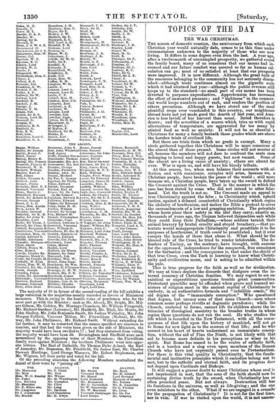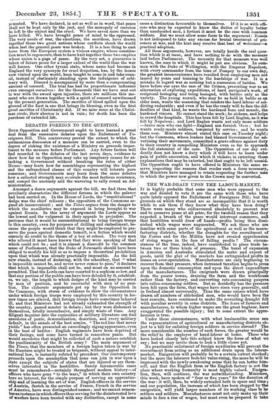TOPICS OF THE DAY
THE WAR CHRISTMAS.
THE season of domestic reunion, the anniversary from which each Christian year would naturally date, comes to us this time under circumstances unknown to the majority of those who are now living. It differs in some degree even from the last. A year age, after a twelvemonth of unexampled prosperity, we gathered round the family board, many of us conscious that our means had in- creased and our future comfort was secured so far as human cal_ oulation can go ; most of us satisfied at least that our prospects were improved. It is now different. Although the great !yak of the resources belonging to the community has not seriously dimin- ished—although trade continues almost on the gigantic scale which it had attained last year—although the public revenue still keeps up to the standard—no small part of our means has been diverted to purposes unproductive. Apprehension has increased the effect of unwonted pressure ; and "tightness" in the commer- cial world keeps numbers out of cash, and renders the position of others precarious. Although we have stored one of the most plentiful crops ever vouchsafed to this country, our neighbours abroad have not yet made good the dearth of last year, and Arne. rice is less lavish of her harvest than usual. Bread therefore is dearer • and the severities of a season which tries us with rapid alternations of temperature, arevated for too many by stinted food as well as anxiety. anill not be so cheerful a Christmas for many a family beneath those grades which are above the harsher trials of civilized life.
But there are trials from which no grade is exempt. Many a circle gathered together this Christmas will be more conscious of the absent than of those present. Some circles will not muster at all, because the members will not dare to confront the seats ones belonging to loved and happy guests, but now vacant. Some of the absent are a living cause of anxiety; others are absent for ever. War is upon us, and will have his bloody tribute.
At this season, too, when men balance their accounts with af- fection and with conscience, scruples will arise, because we, a Christian people, have broken the peace of the world • still more because we, a Christian people, have taken up the sword to defend the Crescent against the Cross. That is the manner in which the ease has been stated by some who did not intend to utter false- hood. Yet the truth is not so. The Crescent made an appeal to true Christianity against the false ; to Christianity which upheld justice, against a debased counterfeit of Christianity which copies the idolatry of heathenism, and makes the Bible a pretext to cover the encroachments of a low and grasping ambition. The potentate whose hosts place their safety in the idol they carry, exactly as, thousands of years ago, the Trojans believed themselves safe while they could keep their Palladium,--whose soldiers tarnish their animal bravery by brutal cruelty and stupid treachery,—that po- tentate would misappropriate Christianity and prostitute it to the purposes of heathenism, if truth could be prostituted.; but it over escapes the hands of those that abuse it. What should be the blessed rule of the Cross, he tried to render intolerable. The de- fenders of Turkey, on the contrary, have brought, with succour for the oppressed, independence for the conquered, free conscience for the barbarian ; and the consequence is, that under the shield of that true Cross even the Turk is learning to know what Christi- anity and civilization mean, and is asking to be admitted within the pale. This is true progress for the faith as well as for civilization. We may at times deplore the discords that disfigure even the in- ternal economy of Christian families. We may regret to see ca- suistical or superstitious questions trouble great commtmities. Protestant punctilio may be offended when grave and learned mi- nisters of religion meet in the ancient capital of Christianity to embody, in an authoritative formula and "infallible oracle,' the old dogma of the "immaculate conception." Who questioned that dogma, but uneasy sons of 'that same Church—meu whose common sense perhaps revolts at dogmatic paradoxes ; while the Church, enslaved to forms, cannot lift its children above the in- tricacies of theological casuistry to the broader truths in whose region these questions do not vex the soul. He who studies the life which is recorded in the New Testament, with all the conse- quences of that life upon the history of mankind, will not go to Rome for new light as to the sources of that life; and he who cannot in his heart of hearts understand an immaculate concep- tion' without the aid of Pius the Ninth, is not likely with that aid to become more definite in his perceptions or wiser in his spirit. But Rome has ceased to be 'the centre of cathdlic faith, and is a burden and a clog even upon members of the Roman Church who have not expressly passed over to Protestantism.
i For there is this vital quality n Christianity, 'that the funda- mental and instinctive principles which it embodies belong not to sect, but to the catholic and eternal faith, and its progress does not depend upon Cardinals and Bishops.
It will suggest a graver doubt to many Christians whose soul is not imprisoned in sect, that the sons of the faith should now be sustaining divine truth by the sword, when Christianity has so often preached peace. But not always. Destruction still has its functions in the universe, as well as life-giving ; and the one even ministers to the other. What if we are engagedin a crusade, for the propagation of Christianity ? It is not for the first time, nor in vain. If war be visited upon the world, it is not unnom- pensated. We have declared, in act as well as in word, that peace shall not be kept only by the just, and the monopoly of coercion be left to the unjust and the cruel. We have saved more than we have killed. We have brought peace of mind to the oppressed. The very needs of war, the exertions, the sacrifices, have drawn together those two great nations whose conflicts shook the world when last the general peace was broken. It is a less thing to cast loose from the European system a vicious empire, whose constitu- tion must be regenerate, than to have knit together those two empires whose union is a gage of peace. By the very aot, a guarantee is taken of future peace for a larger extent of the world than the war will harass. One other tyrant state, whose name had become in England the very synonym for cruel despotism, has, by the lesson now visited upon the world, been taught to come in and take coun- cil, instead of obstinately standing upon the indulgence of arbi- trary will. Discord is accompanied by more than a compensating amount of concord. The trial has had its proportionate influence even amongst ourselves : for the thousands that we have sent out to war with the sword upon injustice, there are millions this mo- ment who are drawn together with a spirit of concord unwitnessed by the present generation. The sacrifice of blood spilled upon the ground of the East is one that brings its blessing, even as the first great sacrifice of Christianity did. If we miss some at the Christ- mas circle, their absence is not in vain; for death has been the purchase of extended life.



































 Previous page
Previous page